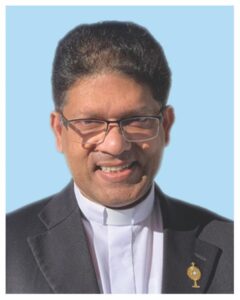
The disciples of Jesus followed him with a high expectation of Jesus establishing the Kingdom of God on earth as soon as they reached Jerusalem. For them, the moment has come for Jesus to enter the capital city, take up his throne, and begin his glorious reign. As he is the long-awaited Messiah of the people of Israel, he would establish a righteous kingdom. They also dreamed of playing great roles and now are arguing on their way who is the greatest among them. Instead of the roles each of them played in that glorious reign, Jesus speaks to them about his upcoming death and resurrection. His teachings seemed very strange to them, and they had a hard time accepting them. They do not yet understand that the way of the Messiah is Via Dolorosa, the way of the cross.
In today’s Gospel reading, we see Jesus establishing the norm for Christian leadership: “If anyone wishes to be first, he shall be the last of all and the servant of all.” (Mk 9: 35). Jesus is redefining leadership as a special vocation to serve the people of God. How can we apply this Jesus-model leadership in our life also? It is only by keeping our eyes fixed on Jesus and becoming more attentive to his word that we allow his values to shape how we think, speak, and act.
The famous German writer and Nobel Laureate Hermann Hesse talks about a mythical journey of a group of men in his book Journey to the East. Hesse is part of this group, and the main character of the story is a person named Leo. Leo tries to keep their spirits high by singing and serving. He is present everywhere and is willing to do anything for his fellow travelers. Hesse writes: “This servant Leo worked in a very simple and natural manner, friendly in an unassuming way, alongside the many forms of our League.” After some time, when Leo disappears for some time, the journey disintegrates. There is no one to help, to direct, to lead, or to tell them what to do next. But when Leo appears again, the journey comes back to its initial order. Thus, Hesse finds out that Leo was not the servant, but he was the leader. In his conversation with Hesse, Leo proclaims the law of service: “He who wishes to live must serve, but he who wishes to rule does not live long.”
Jesus is the greatest model for us in serving others. It is by humbling himself through his incarnation, he expressed his love for us. During the Last Supper, Jesus washed the feet of his disciples and told them to imitate him. Christian ministry and leadership are always understood as service. St. Augustine used to say: “For you, I am a bishop, but with you, I am, after all, a Christian. The former signifies an office undertaken, the latter, grace; the former is a name for danger, the latter a name for salvation.”
We are all prone to the temptation that afflicted the disciples, the temptation to measure greatness as the world, the culture, measures it. We can judge our worth in the light of the values the culture promotes. Our treatment of those who live on the margins of society is the measure of our treatment of God. It can happen that when we are preoccupied with too many material possessions, we lose sight of the important elements in our lives. Today, to follow the way of Christ, we give up our temptations for power and worldly possessions to humility and service. Jesus was great in God’s eyes, yet on the cross he was the least of the least. The message of Jesus is that true greatness depends on becoming a servant for others. Let us try to humble ourselves and ask God for the grace to imitate Christ in our day-to-day life.
Rev. Dr. Mathew Charthakuzhiyil



